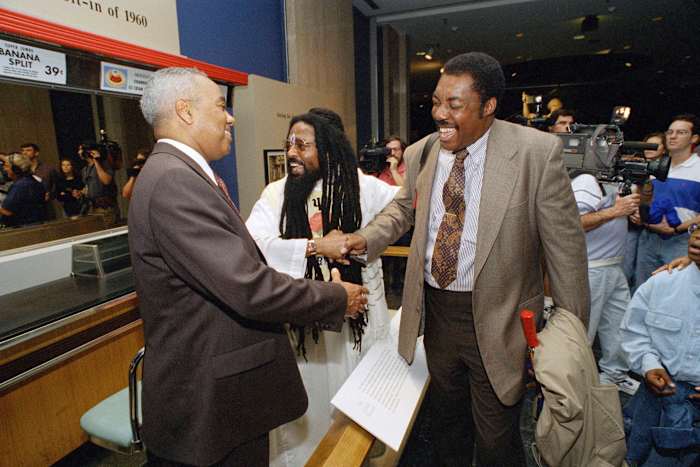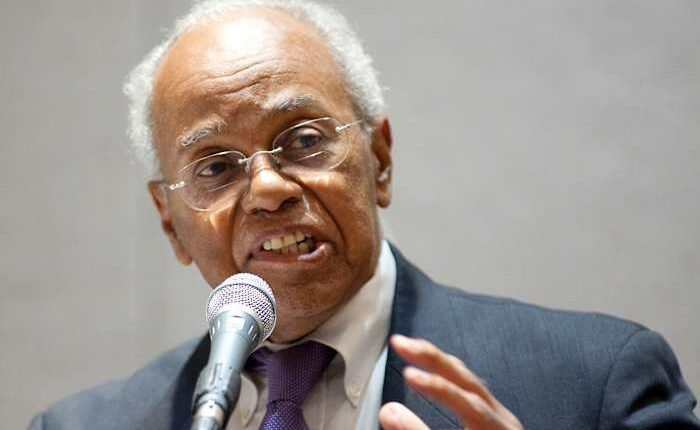Share this @internewscast.com

RALEIGH, N.C. – Joseph McNeil, one of the quartet of North Carolina college students whose sit-in at a segregated Woolworth’s lunch counter 65 years ago became a catalyst for nonviolent civil rights protests across the South, passed away Thursday, his family and university revealed. He was 83.
McNeil, who went on to become a two-star general, was among the four freshmen at North Carolina A&T State University in Greensboro who took seats at the “whites only” counter on February 1, 1960. They were denied service but chose not to leave their seats despite encouragement from the store manager and police to do so.
Statements from North Carolina A&T and the family did not give his cause of death or where he died. McNeil had been living in New York.
The university reported that while McNeil had been facing health issues, he still attended this year’s observance of the sit-in’s 65th anniversary in Greensboro.
With McNeil’s passing, Jibreel Khazan — formerly known as Ezell Blair Jr. — remains the sole surviving member of the four. Franklin McCain passed away in 2014, and David Richmond in 1990.
“We took our mission seriously, and the cause we supported was a grave issue, embodying years of oppression, disrespect, and humiliation,” McNeil stated in a 2010 Associated Press article on the 50th anniversary of the sit-in, which also saw the establishment of the International Civil Rights Museum at the site of the former Woolworth’s store. “Segregation was a wrong that demanded attention.”
On the inaugural day of the sit-in, the young men remained until the store’s closure and returned on subsequent days. Additional protesters joined, growing to over 1,000 by the fifth day. Within several weeks, sit-ins had spread to over 50 cities in nine states. The Greensboro Woolworth’s counter, approximately 75 miles (120 kilometers) west of Raleigh, was integrated within six months.
McNeil and his classmates “inspired a nation with their courageous, peaceful protest, powerfully embodying the idea that young people could change the world. His leadership and the example of the A&T Four continue to inspire our students today,” school Chancellor James Martin said in a news release. A monument to the four men sits on the A&T campus.
The Greensboro sit-in also led to the formation in Raleigh of the Student Nonviolent Coordinating Committee, which became a key part of the student direct-action civil rights movement. Demonstrations between 1960 and 1965 helped pass the 1964 Civil Rights Act and the 1965 Voting Rights Act.
McNeil and the sit-in participants leave a legacy of non-violent protests that “promote equity and social justice and social change in America and throughout the world,” museum co-founder Earl Jones said Thursday.
The students decided to act when McNeil returned to school on a bus from New York — and the racial atmosphere became more and more oppressive the further south he went, according to the AP’s story in 2010.
Joseph A. McNeil grew up in coastal Wilmington and was an ROTC member at A&T. He retired as a two-star major general from the Air Force Reserves in 2001 and also worked as an investment banker. McNeil is honored in Wilmington with an historical marker on a street segment named for him. Then-Vice President Kamala Harris sat at a section of the lunch counter that remains intact within the museum in 2021. Another portion is at the Smithsonian.
McNeil’s family said a tribute to honor his life will be announced separately.
McNeil’s “legacy is a testament to the power of courage and conviction,” his son, Joseph McNeil Jr., said in the family’s statement. “His impact on the civil rights movement and his service to the nation will never be forgotten.”
Copyright 2025 The Associated Press. All rights reserved. This material may not be published, broadcast, rewritten or redistributed without permission.










